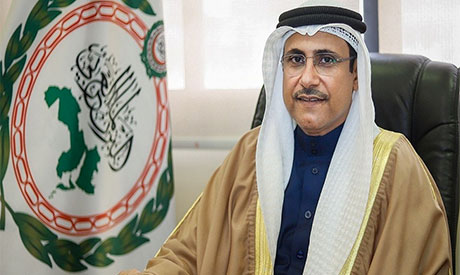
Arab Parliament Speaker Adel Al-Asoumi. Al-Ahram
Arab Parliament Speaker Adel Al-Asoumi affirmed on Saturday the legislature's full solidarity with Egypt and Sudan in the dispute over the Grand Ethiopian Renaissance Dam (GERD), urging Ethiopia to respond to the Egyptian diplomacy's efforts for reaching a legally binding agreement on its dam.
In a statement, Al-Asoumi stressed the Arab Parliament's complete rejection of the Ethiopian approach that seeks to impose a fait accompli on Egypt and Sudan through unilateral measures and steps, which "are totally rejected."
The $4.8 billion Ethiopian hydropower project's last round of talks — which was sponsored by the AU and aimed to revive the already stalled negotiations since January — was held in the AU’s chair country, the DR Congo, in April but failed to stir the stagnant water, with both Egypt and Sudan blaming Ethiopia’s “intransigence.”
Ethiopia intends to commence its second filling of the GERD on 22 July with or without forging a deal. Both downstream countries reject any unilateral move, describing it to be “a clear violation of international law” and “threatens regional security and peace.”
Addis Ababa’s officials have repeatedly announced they would unilaterally fill the GERD’s 74 billion cubic metres (bcm) reservoir with 13.5 bcm in July and August to raise the build-up amount of water to 18.4 bcm, up from the 4.9 bcm it secured without coordination with both downstream countries in 2020.
Al-Asoumi also asserted his support for a letter sent by Egypt to the United Nations Security Council (UNSC) as an official document that reveals the intransigent Ethiopian positions that thwarted the efforts made to reach a fair, balanced and binding agreement for all.
Egypt sent on Saturday a letter to the president of the UNSC expressing its objection to Addis Ababa's plan to move ahead unilaterally with the second filling of the GERD in July in the absence of an agreement with downstream countries.
In the 95-page letter, Egypt noted that the AU talks did not falter because of the lack of agreement on technical matters, but because of Ethiopia's policy of unilateralism, noting that Addis Ababa has adopted "substantively intransigent positions and a procedurally unconstructive attitude."
Al-Asoumi vowed the Arab Parliament will work on reaching out to all international and regional parliaments in order to clarify the constructive and responsible stances taken by Egypt and Sudan to reach an agreement that takes into account the interests of the three countries and preserves their rights.
He affirmed the Arab solidarity towards "this strategic issue" that concerns all Arabs not just Egypt and Sudan.
Arab foreign ministers will hold a meeting in Doha on Tuesday to discuss the GERD recent developments.
On Saturday, Assistant Secretary General of the Arab League Hossam Zaki stressed that Egypt and Sudan are in need of the political support of all members of the pan-Arab body in the Ethiopia dam file.
The two countries decided to get such a support during the AL ministerial meetings in Doha on Tuesday, he said in a phone call with ONtv satellite channel according to MENA.
Egypt, whose 100 million-plus population relies on the world-longest River Nile for more than 95 per cent of its renewable water resources, fears the massive $4.8 billion hydropower project will significantly diminish its water supply, which at 560 m3 per person annually is already well below the international threshold for water scarcity.
While Sudan has said that the unilateral filling of GERD would threaten the lives of millions of its people living downstream the dam, jeopardize the operational safety of its dams, and consequently risk Sudan's national security.
Short link: